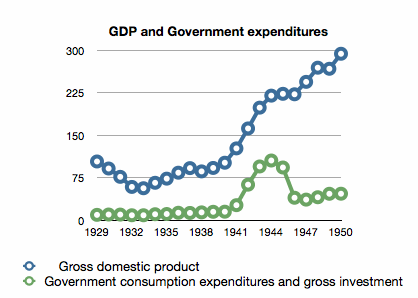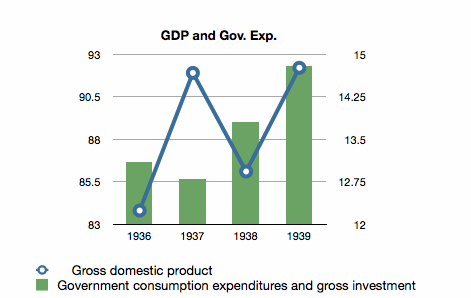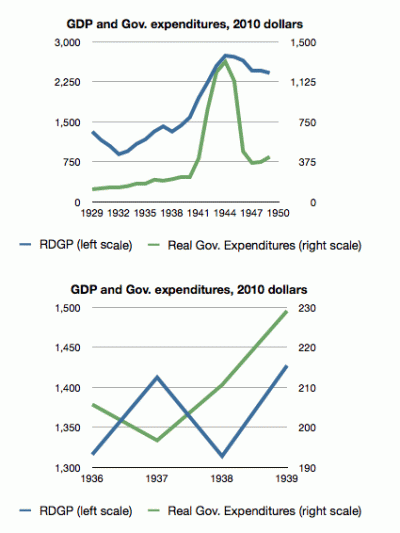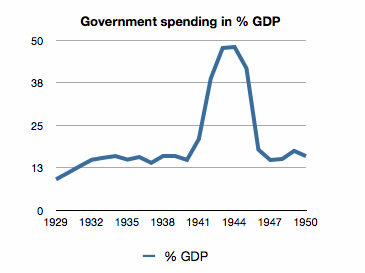- Joined
- Apr 14, 2006
- Messages
- 23,058
That site is a great resource. I may spend some time playing with it today.
We are now running at 45 percent of GDP, I don't know how much bang for the buck you get when you already own 1/2 of the bucks.
It seems to me that promoting government austerity now because we have been unable properly to pull back spending when we were flush in the past will simply compound the problem. It is the cutting off of one's nose to spite one's face.
At this point, we still need government spending to supplement private sector demand or the economy will not recover. What we should be doing is getting serious about the changes needed once the economy is back up to speed. Then, we can cut back.
I remembered Krugman's argument about this, but thought that I would have a look also.The question is - does the Keynesian theory of increasing deficit spending get an economy out of a recession/depression. Again, there is no evidence or examples that it does.




Same data, adjusted for constant 2010 dollars.
View attachment 9591
It does make the 1937 "austerity" show up, but it is still dwarfed by the mountain of war spending, almost 50% of the GDP at its peak. Truly horrifying numbers.
View attachment 9592
The economy took off after the war, despite the huge war debt. Whether this was due to the Keynesian stimulus of the war spending, or the fact that we had pretty much the only manufacturing left in the world is above my pay grade.
All this talk about depression is depressing me. Now, where's my cherry...

In a job market this bad, I figure many employers are hoping to use "fear" to milk as much "free" productivity gain as they can. They may be able to *afford* more, to hire more, to give raises and whatever else, but in this market they simply have no reason to. They don't need to do it for retention and recruitment, and maybe they haven't worked their employees to the breaking point yet, and as long as you can keep them fearful of the unemployment line, let's see -- 50, 60, 70 hours a week, anyone?The odd part about all of this is that companies need workers.
Our organization has lost many people over the last 3 years due to attrition. Yet they have a hiring freeze. We are down 5% in personnel. I know that we could replace 2% or 3% in a year if we get the approval. Our company has the money... yet they wait.
I have no doubt that this is the situation in many many organizations
Zig, don't be so darned cynical. The reason is they don't want to have to go through the agony of laying anyone off should they start hiring and then things take a turn for the worse. Yeah, that's it...In a job market this bad, I figure many employers are hoping to use "fear" to milk as much "free" productivity gain as they can. They may be able to *afford* more, to hire more, to give raises and whatever else, but in this market they simply have no reason to. They don't need to do it for retention and recruitment, and maybe they haven't worked their employees to the breaking point yet, and as long as you can keep them fearful of the unemployment line, let's see -- 50, 60, 70 hours a week, anyone?
I think almost everyone believes in at least some basic form of a social safety net. Heck, just for starters think about how much worse this last meltdown would have been without trust in FDIC insurance.My mother's family was dirt poor, and they all believed (and I think correctly so) that the New Deal programs kept them from starving. Her father was crippled with a broken hip, but her brothers all worked in one alphabet-soup program or another, and kept the family alive.
Oops. That post was just a bit of not-quite-awake nostalgia prompted by the previous post. I wasn't thinking of the context of the thread, and didn't mean to imply anything about social security or present day social safety nets, or lack of them.I think almost everyone believes in at least some basic form of a social safety net. Heck, just for starters think about how much worse this last meltdown would have been without trust in FDIC insurance.
The disagreements mostly come in terms of the size and the approach to building it: how big do we build it? And do we design it (and the rest of economic policy) in a way that those who fall into it will be more likely to use it like a trampoline instead of as a hammock?
I know. I'm just adding that the main points of discussion aren't *whether* some programs as a safety net are appropriate, but how much and in what ways.Oops. That post was just a bit of not-quite-awake nostalgia prompted by the previous post. I wasn't thinking of the context of the thread, and didn't mean to imply anything about social security or present day social safety nets, or lack of them.
If it had a point at all, it was that government programs can do good in ways that economic measures cannot capture.
My mother's family was dirt poor, and they all believed (and I think correctly so) that the New Deal programs kept them from starving. Her father was crippled with a broken hip, but her brothers all worked in one alphabet-soup program or another, and kept the family alive.
The programs may not have lifted the economy out of recession, but they were beyond value to millions of the poor who couldn't find any other work.
I think almost everyone believes in at least some basic form of a social safety net. Heck, just for starters think about how much worse this last meltdown would have been without trust in FDIC insurance.
The disagreements mostly come in terms of the size and the approach to building it: how big do we build it? And do we design it (and the rest of economic policy) in a way that those who fall into it will be more likely to use it like a trampoline instead of as a hammock?
I'm not thrilled about the deficit increase, but I think I could swallow it more easily if the spending was actually accomplishing something. Maybe the CCC should be resurrected. The fire roads where I camp are in pretty rough shape.
Seriously, though, what about targeting some of the spending? We don't need cash for clunkers, the car industry isn't going to die. If a couple companies fail, others will pick up the slack. Green energy? Fine, if it adds value. But no matter where the energy comes from, our power grids could use some serious upgrading. Same with water. I'm no kind of expert on this stuff, and I don't even play one on the internet. But I suspect there might be less complaint about the expenditures if there was real and demonstrable results from it, including employment with value. We don't need more bureaucrats, and I know we're not going to get out of work IT guys building cabins in the woods. I guess I'm in the position of not knowing what will really work, but having a pretty good idea that what we're doing now isn't it.
Golly, that sounds horrible. Which New Deal program required signing over the family farm to receive aid? Do you mean state in the broad sense, or a particular state government?Funny that I was talking to my mother the other day about this and how she had to live with her dirt poor grandmother..... and that GM refused to sign over the farm to the state so they COULD receive food... so they did not eat well...
